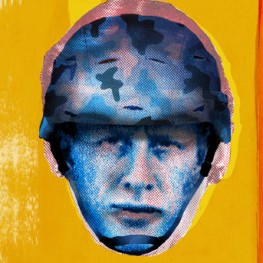“I COULD never imagine what you’ve been through,” she said.
As a former Marine who served in Iraq, I’d heard the sentiment before — it’s the civilian counterpart to the veteran’s “You wouldn’t know, you weren’t there.” But this time it struck an especially discordant note. This woman was a friend. She’d read something I’d written about Iraq — about the shocked numbness I’d felt looking at the victims of a suicide bombing — and it had resonated. As a survivor of child abuse, she knew feelings of shocked numbness far better than I did. And yet, midway through recounting some of what happened to her as a young girl, she said it again: “I’m sorry. I don’t mean to compare my experience to yours. I could never imagine what you’ve been through.”
It felt inappropriate to respond, “Sure you could.” I’d had a mild deployment. She’d mainly have to imagine long hours at a cheap plywood desk in a cheap plywood hut in the middle of a desert. True, there were a handful of alarming but anti-climactic mortar attacks on my forward operating base, and the wounded and damaged bodies I saw at the trauma center, but that was all. Her childhood, though, was full of experiences I couldn’t have handled as an adult, let alone as a child. And what was particularly bewildering was that, even as my friend was insisting that what I’d been through was beyond the limits of imagination, she never once told me, “You aren’t a victim of child abuse. You couldn’t understand.” She wanted me to understand. At the very least, she wanted me to try.
I know an airman who suffered a traumatic brain injury during training just a few years after being in a car accident where he watched his twin brother die. When he tells people about the T.B.I. and the accident and his service, he invariably gets the “I could never imagine” line. “It makes me angry,” he told me. Sure, he wants to say, you don’t think you could understand, but what if I want you to?
It’s a difficult spot to be in, for both. The civilian wants to respect what the veteran has gone through. The veteran wants to protect memories that are painful and sacred to him from outside judgment. But the result is the same: the veteran in a corner by himself, able to proclaim about war but not discuss it, and the civilian shut out from a conversation about one of the most morally fraught activities our nation engages in — war.


